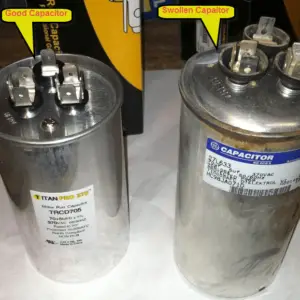Understanding the Symptoms of a Bad AC Capacitor
 The heart of any air conditioning (AC) unit lies within its components, and perhaps one of the most vital among these is the AC capacitor. The AC capacitor is essentially the power source for your air conditioner’s motor and plays a critical role in its operation. It ensures a smooth start and continuous operation of the fan and compressor. When an AC capacitor starts to fail, your air conditioning unit will show several telltale signs. Recognizing these signs early can help prevent further damage, costly repairs, or a complete AC system replacement.
The heart of any air conditioning (AC) unit lies within its components, and perhaps one of the most vital among these is the AC capacitor. The AC capacitor is essentially the power source for your air conditioner’s motor and plays a critical role in its operation. It ensures a smooth start and continuous operation of the fan and compressor. When an AC capacitor starts to fail, your air conditioning unit will show several telltale signs. Recognizing these signs early can help prevent further damage, costly repairs, or a complete AC system replacement.
What Is an AC Capacitor and Its Function
Before we delve into the symptoms of a bad AC capacitor, it’s important to understand what an AC capacitor is and how it functions within the air conditioning system. In the simplest terms, an AC capacitor is a small, cylindrical device that stores and releases electrical energy. It assists in starting up the AC unit’s motors and keeping them running. Capacitors work alongside the compressor, the blower motor, and the outside fan in your air conditioner.
Identifying Symptoms of a Bad AC Capacitor
The failure of an AC capacitor can present itself in various ways. Being vigilant about these symptoms can aid in early detection and timely repair.
1. Difficulty in Starting
An AC system struggling to start or requiring multiple attempts before it kicks off can indicate a failing AC capacitor. This symptom is often known as “hard starting.” The capacitor is responsible for providing the initial boost to start the motor. If it’s failing, it may not provide enough power, causing the unit to struggle to start.
2. Inconsistent Cooling
A malfunctioning capacitor can result in your AC delivering inconsistent cooling. If your rooms are not getting cooled evenly or if the AC seems to blow cool and then warm air, the capacitor could be the issue.
3. High Energy Bills
When an AC capacitor is not functioning optimally, the air conditioning unit must work harder to maintain a cool temperature. This extra work can lead to higher energy consumption, which in turn translates into elevated energy bills.
4. Overheating of the Unit
If your AC capacitor is failing, it could cause your AC unit’s motor to overheat. This happens because the capacitor is unable to provide the necessary energy to run the motors, forcing them to work harder and eventually overheat.
5. Physical Damage
In some cases, the symptoms of a bad AC capacitor can be visible to the naked eye. If the capacitor is swollen, leaky, or shows signs of damage such as burns or cracks, it’s likely that it needs to be replaced.
damage such as burns or cracks, it’s likely that it needs to be replaced.
6. Age of the Unit
Age can be a critical factor in the health of your AC capacitor. The average lifespan of an AC capacitor can range between 10 to 20 years, depending on its usage and maintenance. Therefore, if your air conditioner is old and you’re noticing performance issues, the capacitor could be the problem.
7. Unusual Noises
A humming or clicking noise coming from your AC unit could signal a bad capacitor. These noises typically occur because the capacitor is struggling to kick-start the motors, creating an unusual noise in the process.
Conclusion: Take Timely Action
Detecting the symptoms of a bad AC capacitor early can help save you time, stress, and potentially large repair costs. If you notice any of the above signs, it’s advisable to call a professional HVAC technician to examine your unit. Regular maintenance of your AC unit can also play a key role in extending the lifespan of your AC capacitor and overall system.

